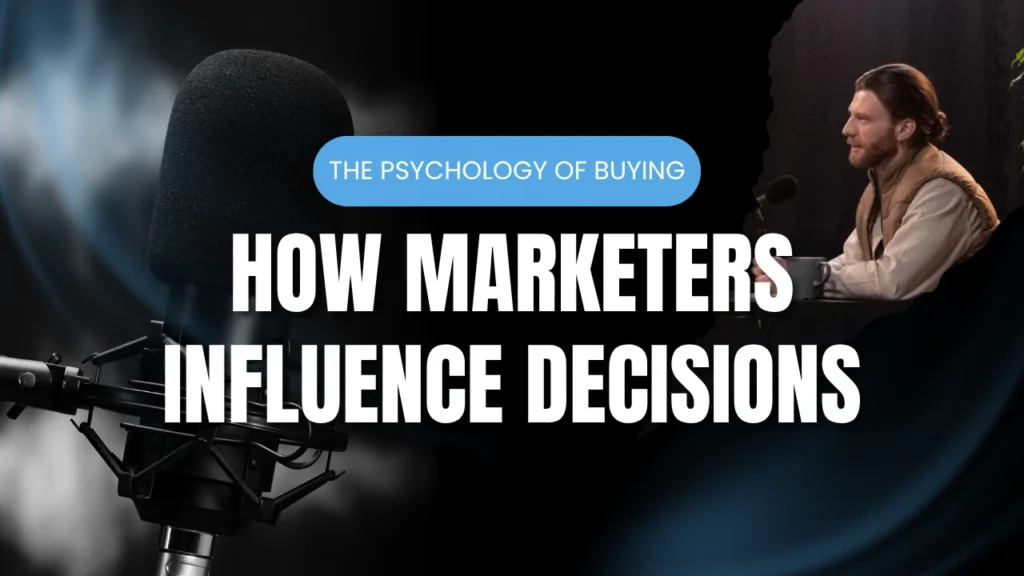The Psychology of Buying: How Marketers Influence Decisions
August 5, 2025
Digital Marketing Services

If you’re a business owner or marketer, understanding the psychology of buying is a powerful asset. It allows you to influence decisions, connect with your audience, and ultimately drive more sales.
In this article, we’ll explore key psychological triggers that guide purchasing decisions—and how marketers can use them ethically to increase customer engagement.
Table of Contents
Why the Psychology of Buying Matters
Before people click “Buy Now,” their minds go through a complex process. From emotions and first impressions to biases and fears, their choices are influenced by multiple factors.
Understanding these mental triggers helps you:
- Improve conversions
- Build stronger brand trust
- Create high-performing campaigns
- Reduce customer hesitation
Let’s explore the most effective psychological principles used in marketing today.
1. The Halo Effect
The halo effect means that the first impression of a brand or product affects how people see everything else about it.
If your website looks clean and professional, customers will likely assume your products and service are high-quality—even if they’ve never purchased before.
2. The Serial Position Effect
This principle says that people remember the first and last items in a list best. Whether it’s pricing plans or feature lists, the beginning and end are the most powerful real estate.
3. Scarcity Creates Urgency
Limited-time offers or low stock levels increase demand. When people feel they might miss out, they act faster.
Words like “Only 3 left!” or “Offer ends soon!” tap into this scarcity principle and motivate users to take immediate action.
4. Social Proof Builds Trust
Consumers trust other customers more than brands. Testimonials, reviews, and case studies show that others had a good experience—reducing the risk in the buyer’s mind.
5. Loss Aversion Is a Strong Motivator
People are more afraid to lose something than they are excited to gain something. This is called loss aversion.
Phrases like “Don’t miss this deal” or “Avoid losing valuable leads” often perform better than “Get more traffic.”
6. Authority Bias Enhances Credibility
Customers trust recommendations from experts or influencers. Even small trust badges (like “Featured in Forbes” or “Used by 10,000+ customers”) can increase conversions.
7. Reciprocity Builds Loyalty
When you offer something valuable for free—like an ebook, discount, or free tool—users feel inclined to give back. This principle of reciprocity builds goodwill.
8. Simplicity Reduces Friction
Too many choices or a cluttered layout can overwhelm users. Keeping things simple improves clarity and encourages faster decisions.
Use concise copy, clear CTAs (call-to-actions), and a straightforward checkout process.
Using Buyer Psychology Ethically
These principles are powerful—but with great power comes responsibility. Always use ethical practices. Avoid fake scarcity, misleading testimonials, or manipulative language.
The goal of using buyer psychology is to build trust, engagement, and long-term relationships, not just one-time sales.
Conclusion: Market to the Mind
By applying the psychology of buying, you can improve how your audience responds to your brand. These cognitive triggers help you:
- Write better sales pages
- Improve ad copy
- Reduce bounce rates
- Increase conversions
Whether you’re selling a product, service, or idea—understanding how your customers think gives you the ultimate marketing advantage.
Grow your business with our expert digital marketing services in Prayagraj. From SEO to social media and lead generation, we help you reach more customers and boost your online presence.
FAQs
1. What is the psychology of buying in marketing?
The psychology of buying refers to how consumers make decisions based on emotional, cognitive, and behavioral triggers. Marketers use these insights to influence purchasing behavior, improve messaging, and increase conversions.
2. How does the halo effect impact consumer behavior?
The halo effect means that a customer’s first impression of a brand or product heavily influences how they view everything else about it. A positive first impression can build trust and increase the chance of purchase.
3. Why is scarcity important in marketing?
Scarcity creates a sense of urgency, prompting people to act quickly for fear of missing out. Limited-time offers or low stock levels can motivate buyers to make faster decisions.
4. How can marketers ethically use psychological triggers?
Marketers should use psychological triggers to build trust, provide value, and enhance user experience—not to manipulate. Ethical use includes honest messaging, real reviews, and genuine scarcity.
5. What is loss aversion and how does it affect buying decisions?
Loss aversion is a psychological bias where people prefer to avoid losses over acquiring gains. In marketing, messages that highlight what a customer might lose are often more persuasive than those focused on benefits.
About the Author
Satyam Gupta
Hi, I'm an SEO specialist with expertise in driving organic traffic, optimizing websites, and enhancing online visibility through tailored strategies, keyword research, and content optimization techniques.
